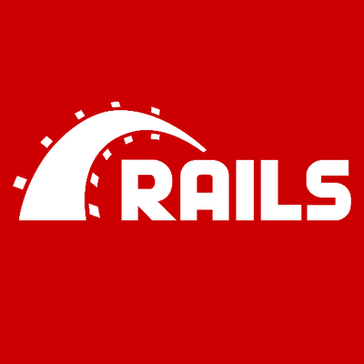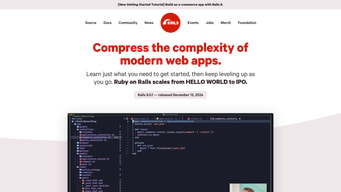

Unclaimed: Are are working at Ruby On Rails ?
Ruby On Rails Reviews & Product Details
Ruby on Rails, often referred to as Rails, is an open-source web application framework written in Ruby. It emphasizes convention over configuration (CoC) and the don't repeat yourself (DRY) principle, aiming to simplify and accelerate web development by providing default structures for a database, a web service, and web pages. Rails enables developers to use a model-view-controller (MVC) pattern to organize application programming. Its rich ecosystem of gems (libraries) allows for rapid development of complex web applications.

| Capabilities |
API
CLI
OSS
|
|---|---|
| Segment |
Small Business
Mid Market
Freelancer
Enterprise
|
| Ease of use |
Intermediate
Advanced
|
| Deployment | Cloud / SaaS / Web-Based, N/A, On-Premise Linux, On-Premise Windows |
| Support | FAQs/Forum |
| Training | Documentation |
| Languages | English |



Simple to use, powerful, intuitive, quite popular
steep learning curve, trying to do everything at once
I'm building applications for the web and mobile and Ruby on Rails solves that except the native mobile app or desktop app part kind of (I use WebViews)
I have used ruby on rails for almost 8 years from 2.x to 5. Development in ruby on rails is rapid and they way it structure code with the rake commands that improves the quality of code.
Ruby on rails comes with lots of breaking changes whenver a new version releases and that makes life of a developer difficult if you want to migrate from old to new version.
We were using ruby on rails for rapid prototype development and rest APIs for our mobile app. Its scalable and easy to connect with lots of services. Like redis, mongoddb, postgres, sendgrid..etc.
Its lemma DRY - Don't repeat yourself promotes not writing twice the same code but using mechanisms and tools provided by Ruby and its framework Rails. Besides the way to create backend and frontend (now with Stimulus) is very clear, concise and standard. This leads to short code that is easy to understand, to debug and to correct. For the errors I have had with the framework I have opened issued in github and several people have jumped to solve.
I wish there would be more tools for Stimulus to make nice frontends even easier, but it is on very good way for that. For newcomers the learning curve is step but it is worth.
Developing web applications.
It gives us the power of rapid development and is battle-hardened for long term use
Vibrant 3rd party package (gem) community, but many of them are out of date
Ruby on Rails gives us the tools we need to focus on product features and testing, without getting bogged down with low level implementation details like validation or SQL queries
Convention over configuration. A rails developer will be able to work on any rails project without a steep learning curve. Rails "magic" lets us focus more on delivering new features instead that the minutae.
Performance is not comparable to other languages/frameworks.
Easy configuration and blazing quick setup for a startup project. Lets us focus on implementing features rather than the structure of the application and inner workings.
- scaffolding feature gives you fastest development experience - mvc structure facilates manageable file structure. - gem library gives you some well developed and tested features without investing time in those features.
- upgrading rails version is such a pain, we need to upgrade all the dependecy Which might break your application , need thoroughly testing after rails version upgrade.
- stand alone web application development - embedded shopify applications development - real estate application development - survey based application development
It makes the development process very easy and faster. It gives a complete MVC and can also be integrated with other frontend frameworks like reactJS, angularJS, ember, etc.
Upgrading a Rails version is such a pain, by the time a new version comes, we need to look for the latest ruby version, and the server stack should also support it unless your upgrading to the latest version will consume your time, and you have to give extra effort to upgrade version on server.
- makes the development process very easy and faster - web application development and deployment becomes very easy with the environment they provide - with the testing suits it support it stabilize the application
Ruby on Rails has been growing in the last five years and it's a popular solution to build web applications. You can build agile solutions on the development. This feature makes Ruby on Rails a great tool for many companies around the world where the time it's equivalent to money. Ruby on Rails it's an on-demand framework love it by experimented and non-experimented developers where we want to simplify common and repetitive tasks easily you can reuse existing components this feature lets you save much time. Another feature that I love it's the way to implement gems easily you can build great solutions in a lower time. You can create Unitary Tests using RSpec or web functionality with Capybara or Sellenium.
One of the things that I being facing this time using Ruby on Rails and I hate it; it's where you want to read or write the database.
At my work daily got tickets from our customers requesting new features. Ruby on Rails provides me a fast way to provide work in a lower time.
Ruby on Rails is a great framework for building RESTful apps. It's extremely intuitive and easy to use and read. You can build powerful apps with just a few commands, and setting up a database for your API is extremely simple. Also the community is amazingly helpful, and given that Ruby is so popular nowadays most of the problems you'll come in contact with have an easy-to-follow solution online, just a couple of clicks away. There are also a lot of great talks on youtube by Robert C. Martin (Uncle Bob) on Ruby, Rails and RESTful apps which are really easy to follow and cover everything on the subject.
I can't say there's much I dislike about Ruby on Rails. My only issue is downloading and setting everything up to use on my workstations, but once that's dealt with everything's smooth sailing from there.
All of my backend developing is done on Ruby on Rails, and I wouldn't change it for anything else. It has a Gem (a Ruby library) for anything you might need, and the framework as a whole is extremely well organized, allowing you to work using a lot of different practices, like TDD or Test Driven Development, really easily.
One of the great things about Ruby on rails is that it is so easy to read other peoples code. I also love that there are so many great library is that you can plug-in to really enhance your code velocity.
I think that there are some languages like elixir which have better tools for debugging. But overall with a lot of the rails library’s, it has everything that I need on a day-to-day basis.
I’m solving problems in terms of building with SMS chat bots. Ruby on rails is the tool that we use for our backend code. We also use Ruby on rails for different authentication purposes and for some of our view layers with admin tools and with client portal’s.